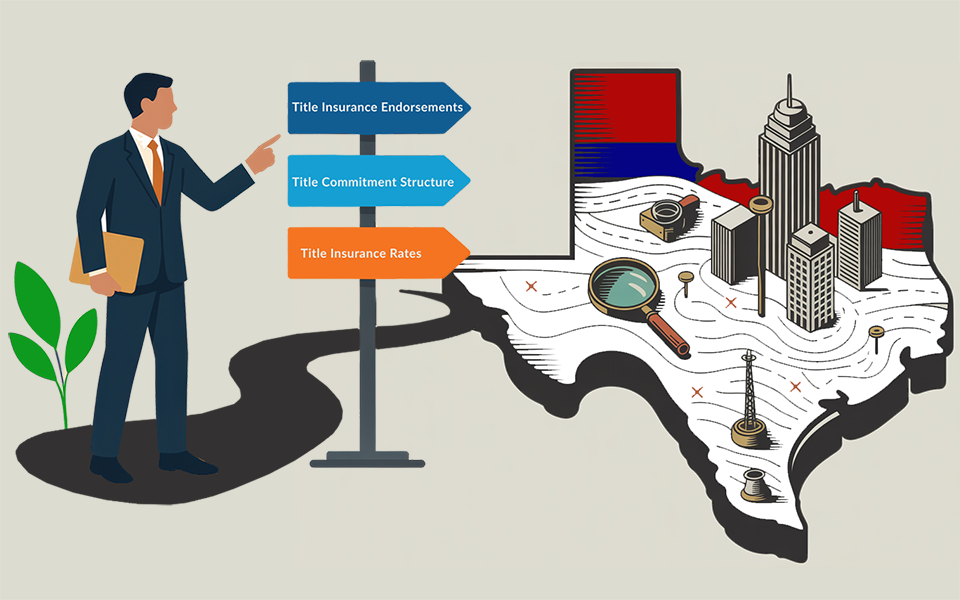December 22, 2025
Navigating Florida’s Title Regulations for Small Title Agencies

Running a small to mid-sized title agency in Florida can feel like juggling flaming torches—there’s licensing, escrow accounting, audits, data security, and now emerging trends like digital closings and cryptocurrency. But compliance isn’t just a regulatory burden; it’s the foundation of client trust, operational efficiency, and long-term growth. At Skyline Title Support, we’ve turned Florida’s complex rules into a clear roadmap. In this article, you’ll find concise information explaining each topic, punctuated with bullet-point checklists and best-practice summaries to make your compliance journey smoother.
Licensing and Agency Setup Requirements
Every agency begins with a rock-solid legal foundation. In Florida, that means:
Entity formation & naming:
- Register your LLC or corporation via Sunbiz.
- If you use terms like “Title Insurance,” you must include “Agency” or “Agent” in the name.
- File annual reports on time and maintain a registered agent.
Designate a Title Agent in Charge (AIC):
- The AIC must hold an active Florida title agent license (or be a practicing attorney).
- This person oversees day-to-day compliance, from escrow handling to licensing renewals.
Insurance & bonding:
- Maintain Errors & Omissions coverage of at least $250,000 (with no more than a $10,000 deductible).
- Carry a fidelity bond of at least $50,000.
- Keep current certificates on file and upload proof during DFS renewals.
Annual administrative surcharge:
- Budget $200 each January 30th for the DFS surcharge.
- Missing this deadline can trigger late fees or a license suspension.
Staff licensing:
- Anyone performing title functions must hold a 4-10 Florida title agent license.
- Unlicensed staff are limited to clerical tasks—no escrow handling or legal advice.
By checking each item off this list, you ensure your agency’s legal structure meets Florida’s statutes from day one.
Building a Robust Compliance Program
Beyond licensing, regulators expect a culture of compliance embedded in every transaction. Start with a written policies and procedures manual that covers:
- Escrow handling and trust-fund safeguards
- Policy issuance workflows
- Document recording and retention
- Privacy and data-security protocols
- Fraud-prevention and red-flag detection
Next, implement segregation of duties. For example, the person reconciling escrow accounts should not be the same individual disbursing funds. Require dual sign-offs on high-value checks or wire transfers.
Designate a compliance officer—often the AIC—to monitor rule changes, coordinate training, and conduct periodic self-audits. Quarterly file reviews and monthly escrow spot checks help you catch small issues before they become major findings.
Integrate federal requirements (RESPA for closing disclosures, GLBA for data privacy) into your program. Many small agencies also adopt the ALTA Best Practices framework as an industry benchmark, demonstrating to lenders and underwriters that your internal controls align with national standards.
Finally, prioritize ongoing training. Host brief, monthly sessions on emerging threats—whether it’s a sophisticated wire-fraud scheme or the latest cyber-attack tactic. Maintain attendance logs and training materials; they’re invaluable proof of your proactive stance during any examination.
Staying Audit-Ready with DFS Examinations
Florida’s Department of Financial Services (DFS) can audit your agency at any time, so “audit-ready” should be your default setting. Regulators typically examine:
- Escrow compliance – deposits, disbursements, reconciliations
- Premium accounting – adherence to promulgated rates, timely remittance
- Licensing and bond currency
- File completeness – signed closing statements, policies, checks, correspondence
To streamline this, develop a self-audit checklist with recurring tasks:
Monthly:
- Reconcile every escrow account
- Confirm deposit logs match daily receipts
- Remit policy premiums and file confirmation
Quarterly:
- Compare policy logs against underwriter statements
- Perform random transaction file reviews
- Verify E&O and fidelity bond expiration dates
Annually:
- Renew agency license and surcharge payment
- Update your policies and procedures manual
- Conduct a mock audit with a compliance consultant
Common pitfalls include commingling funds, late deposits, expired insurance, and unauthorized fee structures. Knowing these typical errors lets you double-check your processes proactively. And by commissioning a mock audit, you give your team real-world practice and uncover blind spots before the state does.
Trust Accounting Best Practices
Handling client escrow funds is a fiduciary duty enforced by Florida law. Follow these best practices:
- Separate trust account: Use an FDIC-insured account exclusively for escrow, clearly labeled “Trust” or “Escrow.”
- Immediate deposit: Deposit all funds the same day you receive them to avoid float issues.
- Three-way reconciliation: Monthly, reconcile (1) bank statement balance, (2) book balance, and (3) escrow trial balance—accounting for outstanding checks and in-transit deposits.
- File-level ledgers: Maintain a running ledger for every transaction; record all receipts/disbursements with dates, check numbers, and payees. Retain these ledgers for at least three years (though five to seven years is best practice).
- Underwriter reporting: Send monthly reconciliation reports to each underwriter you represent; they keep copies for five years, and you should follow your own retention policy.
- Shortage resolution: Cover any shortage immediately from operating funds and notify your underwriter—unresolved shortages are a red flag for regulators.
- Internal controls: Limit authorized signatories, require dual signatures above a set threshold, and consider an annual independent escrow audit by a CPA.
By making these steps habitual, you protect your clients’ funds and maintain a spotless compliance record.
Continuing Education and Team Training
Florida requires each licensed title agent to complete 10 hours of continuing education (CE) every two years, including at least three hours on ethics, compliance, or Florida-specific rules. Failing to meet these requirements can lead to license suspension, so track your renewal deadlines in DFS MyProfile and schedule coursework in advance.
Approved providers—such as the Florida Land Title Association—offer online modules covering escrow accounting updates, regulatory changes, and fraud prevention. But CE alone isn’t enough. Small agencies thrive when they cultivate a learning culture:
- Host quarterly lunch-and-learn sessions on hot-button topics (e.g., wire fraud, remote online notarization updates).
- Encourage advanced designations (ALTA’s National Title Professional, FLTA certifications).
- Maintain sign-in sheets, materials, and quick quizzes to reinforce knowledge.
Documenting internal training not only enhances your team’s competence but also demonstrates to regulators that compliance is a living, breathing part of your operation.
Cybersecurity and Data Privacy
Title agencies handle sensitive personal and financial data—making cybersecurity and privacy compliance imperative. Key steps include:
- Written incident response plan under Florida’s Information Protection Act for breach notifications.
- Risk assessments and safeguards per the Gramm-Leach-Bliley Act (firewalls, antivirus, multi-factor authentication).
- Secure communication: encrypt emails or use secure portals for wiring instructions; verify by phone before releasing funds.
- Access controls: limit sensitive data access on a need-to-know basis and promptly revoke credentials when staff leave.
- Regular backups: automate encrypted offsite backups to recover from ransomware quickly.
- Proper disposal: shred paper documents and use secure-wipe tools for digital files containing nonpublic personal information.
- Cyber insurance: consider a policy to cover breach response costs, legal fees, and business interruption.
Proactive cybersecurity measures protect your clients and preserve your agency’s hard-earned reputation.
Recordkeeping, Reporting, and Document Retention
In Florida, meticulous recordkeeping is non-negotiable. Your obligations include:
- Transaction files: retain signed closing statements, title policies, correspondence, and escrow ledgers for at least three years (though five to seven years is best practice).
- Escrow records: keep reconciliation workpapers, bank statements, and ledger cards for a minimum of three years.
- Policy logs & remittances: track each policy issued, premium charged, underwriter, and remittance date; reconcile against underwriter statements monthly.
- Annual data call: submit Florida’s Title Insurance Data Call on policies and premiums through the OIR portal.
- Material changes: report AIC transfers, ownership changes, or office relocations to DFS within 30 days in MyProfile.
- Administrative surcharge: pay $200 by January 30 each year and retain confirmation receipts.
- Retention policy: publish a formal policy detailing how long each record type is stored and the method of secure disposal.
Use a shared digital compliance calendar or task manager to automate reminders for these recurring duties—ensuring you never miss a deadline.
Emerging Compliance Challenges
Florida’s title industry is evolving rapidly. Stay ahead by addressing:
- Remote Online Notarization (RON): Florida permits RON under Chapter 117, but it requires strict identity-proofing, tamper-evident technology, and audio-visual recording retention. Update your policies and train staff to supervise every RON transaction according to state specs.
- Cryptocurrency in Real Estate: While still emerging, some buyers offer crypto for down payments. Handling digital assets raises custody, valuation, and anti-money-laundering concerns. Work closely with your underwriter and legal counsel as guidance develops.
- AI-Powered Tools: Document-review automation can boost efficiency but introduces risk if outputs aren’t verified. Maintain human oversight and document your review protocols.
By proactively integrating these topics into your compliance program, you position your agency as a forward-thinking partner in every transaction.
Cost-Benefit Analysis: Compliance vs. Non-Compliance
Compliance incurs costs—licensing fees, insurance premiums, software subscriptions, staff training, and consultant fees. Yet non-compliance is far more expensive:
- Direct penalties: fines, restitution demands, license suspensions.
- Indirect costs: skyrocketing E&O premiums, lost referrals, reputational damage.
- Business interruption: audits and investigations divert time from revenue-producing activities.
In contrast, a well-structured compliance program often yields:
- Lower E&O rates over time
- Streamlined workflows that free up staff time
- Greater lender and client confidence, translating into more referrals
Viewed as an investment rather than an expense, compliance drives both risk reduction and operational efficiency.
Compliance for Remote Work
Hybrid and fully remote teams necessitate additional controls:
- Licensing & supervision: remote employees must be properly appointed and have tracked system access.
- Secure home environments: require company-managed devices, encrypted VPN connections, and clear-desk rules for physical files.
- Virtual training & audits: conduct live online compliance sessions and periodic remote file reviews, preserving attendance logs or screenshots as evidence.
- RON integration: if you facilitate remote closings, verify that your RON provider meets Florida’s technical and retention requirements.
By extending your compliance framework to wherever your team works, you maintain control and remain audit-ready in any setting.
Regulatory Updates & Skyline’s Role
Florida’s statutes and administrative rules can change multiple times a year. To keep pace:
- Subscribe to DFS and OIR bulletins.
- Attend FLTA webinars on rule changes.
- Review ALTA’s evolving model recommendations.
Conclusion
Navigating Florida’s title regulations may seem daunting, but with a structured approach and the right partner, any small agency can transform compliance into a competitive advantage. By securing proper licensing, building robust internal controls, mastering escrow best practices, staying current on education and cybersecurity, and embracing emerging trends, you’ll safeguard your clients and your license. Ready to simplify compliance and focus on growth? Contact Skyline Title Support today, and let’s build a compliance framework that powers your success in the Sunshine State.
Related Posts
How to Read a Title Commitment: 12 Exceptions That Scare Buyers (But Don’t Always Kill the Deal)
If you have ever opened a title commitment and felt your stomach drop when you hit the exceptions, you are not alone. Buyers often see a long ....
January 31, 2026
2026 Title Industry Outlook: Top 10 Trends That Will Redefine Due Diligence and Closings
The title industry is heading into 2026 with more moving parts than at any time in recent memory: rapid regulatory change, deeper fraud risk ...
December 22, 2025
Beyond the Basics: Navigating Title Complexity in Texas Commercial Real Estate
Last spring, a Dallas investor was three days from closing on a mixed-use development site when the title examiner discovered something unusual ...
December 22, 2025
Witchy Titles & Cursed Closings: What Salem’s History Can Teach Us About Real Estate Due Diligence
In 1692, the town of Salem, Massachusetts descended into chaos. Fueled by fear, rumors, and suspicion, dozens of people were accused of witchcraft and ...
December 22, 2025
Title Under Siege: A First Look at Our New Guide to Deed Fraud and Seller Impersonation
Seller impersonation, in particular, is on the rise. In these cases, a scammer poses as the property owner—usually targeting vacant land, rental...
December 22, 2025
Real Estate Due Diligence Checklist: 9 Hidden Costs That Kill Closings
Imagine this: A $3.2 million Miami Beach home sale implodes because of a $127 unpaid utility lien that no one caught in time. Absurd as it sounds ...
December 22, 2025
Land Surveys vs. Title Searches: When You Need Both (and How to Budget)
Picture this: you’re days away from closing on a home when an unexpected hiccup surfaces. The seller’s old fence sits two feet inside the neighbor’s...
December 22, 2025
Top 10 Municipal Red Flags That Can Delay Your Closing (and How to Fix Them)
Real-estate contracts are filled with dates, deposits, and delivery deadlines. Yet even when buyers, sellers, and lenders stay on schedule ...
December 22, 2025
How Can Large Title Companies Thrive in Volatile Times?
When mortgage rates climbed to 23-year highs in late 2023, one national title insurer watched transaction volume plummet 45% over eight weeks yet ...
December 22, 2025
Summer Real Estate: Keep Closings Cool When the Market Heats Up
Summer signals one of the busiest times in real estate, especially in Florida, as well as in fast-growing markets like Texas, Arizona, and ...
December 22, 2025
Top Mistakes When Ordering a UCC Search
UCC Searches are crucial in risk assessment and due diligence in commercial lending and secured transactions. Yet despite their importance, we have ...
December 22, 2025
The Title Pro's AI Companion: Using Skyline's SmartTitle Assistant
How much time did you spend drafting repetitive client emails today? Our average title professional saves 5+ hours weekly using SmartTitle Assistant™ ...
December 22, 2025
UCC Search vs. Title Search: What's the Difference — and Do You Need Both?
In the complex world of real estate transactions, due diligence is everything. Whether you're a lender evaluating a loan application, an investor ...
December 22, 2025
Navigating Market Volatility: What Title Professionals Need to Know Now — and What's Ahead in 2025
In today's real estate landscape, the only constant is change. Fluctuating interest rates, economic uncertainty, and shifting regulatory policies have ...
December 22, 2025
What Happens if a Satisfaction of Mortgage is Not Properly Recorded?
Paying off a mortgage is a significant financial milestone, but the process isn’t complete until the lender records the mortgage satisfaction with the ...
December 22, 2025
Generating New Business for Title Companies in a Competitive Market
The title industry is transforming. Increased competition, technological advancements, and shifting consumer expectations are challenging traditional ...
December 22, 2025
Spring Cleaning for Your Property Title: How to Refresh Your Real Estate Records
Millions of real estate transactions are delayed or fall apart each year due to title issues that could have been prevented. In fact, a recent study ...
December 22, 2025
Top Strategies to Prevent Quiet Title Issues
Quiet title disputes are a serious concern for real estate professionals, as they can disrupt transactions and create uncertainty around property ownership ...
December 22, 2025
Title Services for New Construction: What Builders and Developers Need to Know
The construction of a new home or commercial property is an exciting and ambitious project, but it comes with more than just design and building ...
December 22, 2025
Will AI Agents Replace Title Professionals? The Truth About Automation
Artificial intelligence (AI) has evolved beyond simple data analytics and chatbots. Today's AI "agents" can interact with web browsers, gather and analyze ...
December 22, 2025
10 Reasons Why Skipping a Land Survey Can Be Costly
A land survey might seem like an unnecessary expense, especially if the property has been owned for years without any issues. However, skipping this step ...
December 22, 2025
Title Industry 2.0: Harnessing AI, Data, and Cybersecurity for a Resilient Future
The title industry is at a crossroads. Traditional methods that have served us well for decades now face mounting challenges in an increasingly ...
December 22, 2025
How Title Services Impact Mortgage Underwriting Timelines
In the world of real estate, the journey from application to closing is filled with numerous moving parts. Among these, title services are a crucial yet ...
December 22, 2025
How Title Companies Can Meet Tight Deadlines Without Sacrificing Quality
In today's fast-paced real estate environment, speed is crucial. Title companies often find themselves in high-pressure situations where they must juggle ...
December 22, 2025
5 New Year's Resolutions for Title Companies in 2025
As 2025 kicks off, the title industry is moving faster than ever. With new technologies, shifting customer needs, and more complex regulations, there’s ...
December 22, 2025
How to Explain Title Insurance to Your Clients: A Real Estate Agent's Guide
Explaining title insurance isn't always straightforward, but with the right approach, it can become a valuable teaching moment for your clients. Picture this ..
December 22, 2025
The Hidden Complexities of Property Title Searches
You've found your dream home. The price is right, the location is perfect, and you're ready to sign on the dotted line. But before you do ...
December 22, 2025
What’s Next for the Title Industry? Key Trends for 2025
The title industry is at a pivotal moment, with 2025 shaping up to be a year of significant transformation. From groundbreaking technologies like blockchain ...
December 22, 2025
Commercial Property Title Due Diligence: Going Beyond the Basics
The landscape of commercial property title due diligence has transformed dramatically over the past three decades. Gone are the days when a basic title ...
December 22, 2025
Beyond the Standard Search: Advanced Commercial Title Due Diligence in Florida
Last month in South Florida, a seasoned commercial real estate investor nearly walked away from a $12 million mixed-use development purchase ...
December 22, 2025
Navigating the Cyber Minefield: A Title Professional's Complete Guide to Phishing Defense
The title industry is a prime target for cybercriminals, and phishing is one of the most common threats that title professionals face today. Imagine this ...
December 22, 2025
Elevating Your Title Company to New Heights - A Blueprint for Growth
Let's be honest – growing a title company isn't what it used to be. Gone are the days when simply maintaining the status quo was enough to ...
December 22, 2025
This Halloween Avoid Real Estate Nightmares: 5 Spooky Title Issues That Can Haunt You
Buying a new home is exciting, but not all surprises are welcome. Some title issues can be like ghostly figures lurking in the shadows ...
December 22, 2025
How to Overcome Common Title Operations Challenges and Boost Efficiency
Running a title company means you’re a key player in the real estate world, making sure property transactions go smoothly and securely. But, we get it ....
December 22, 2025
🎙️QuickCast: Future Trends in the Title Industry.
The title industry, like many others, is undergoing significant transformation due to technological advancements. While some of these changes ...
December 22, 2025
Understanding Municipal Lien Searches: A Complete Guide
Imagine this scenario: You've discovered an incredible property, yet as the closing date approaches, an unsettling surprise reveals itself—a municipal lien...
December 22, 2025
Wire Fraud : Proven Defense Tactics for Title Professionals
Wire fraud is a rapidly growing threat in the real estate industry, with fraudsters becoming more sophisticated and aggressive in their ...
December 22, 2025
Preparing for August 17th: Essential Information on the NAR Broker Commission Changes
The real estate market is about to undergo significant changes as new commission regulations take effect on August 17. These changes ...
December 22, 2025
Maximize Efficiency in Your Title Business with AI
Integrating AI into title businesses can significantly enhance efficiency, accuracy, and customer service. By automating routine tasks, improving...
December 22, 2025
The Importance of Land Surveys in Property Transactions: What You Need to Know
Boundary surveys are essential in property transactions to accurately define property lines, identify encroachments, and resolve disputes. Conducted ...
December 22, 2025
Summer Selling Season: Essential Steps for Real Estate Pros to Ensure Smooth Transactions
Essential steps for real estate professionals to ensure smooth transactions during the bustling summer selling season include preparing properties, ...
December 22, 2025
Recent Posts


















































.png)

